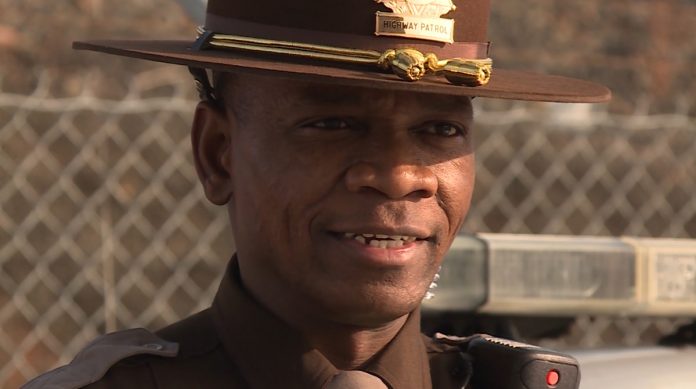Utah Highway Patrol trooper Daud Eftin, a refugee from Somalia, is pictured in Murray on Monday, Jan. 14, 2019. In 1998, his family was resettled to the U.S. and started a fresh life. In 2003, his family made it to Utah. He learned the language and earned his bachelor’s and master’s degrees, which eventually led him to the Utah Highway Patrol.
The journey of a typical Utah Highway Patrol trooper can span hundreds of miles in a single day, but Daud Eftin’s journey isn’t exactly typical.
His story spans continents and decades as a refugee from Somalia.
“We ended up migrating from Somalia to Kenya, just about early 1990s, as a result of the civil war that broke out in Somalia,” Eftin recalled, standing next to his UHP cruiser. “Just about 1998, we got acceptance to resettle to the U.S. as a refugee and start a fresh life.”
By 2003, the family had made it to Utah, and it was only a couple more years before Eftin grew fascinated with law enforcement.
“I met a school resource officer at Horizonte that I kind of talked to about his role in the community, and he kind of filled me in as to what he does and how he gets paid,” Eftin explained. “I’m like, ‘So you get paid to go help people.’ He said, ‘Yes,’ and I said, ‘What are the dangers?’ He said, ‘Well, you can get killed,’ and I said, ‘That’s fine — death is upon us at some point.’”
Eftin was hooked.
More than a decade later, his path that included learning the language and earning his bachelor’s and master’s degrees eventually led him to Utah Highway Patrol.
“One, it’s humbling and, two, it’s rewarding to know that this is the ‘land of opportunity,’” Eftin said. “It just takes a lot of dedication and effort; it takes a lot of motivation.”
The trooper now says he wants to become an “agent.”
“I wanted to be an agent of change for the refugee community, specifically, to show them (to) forget the stigma of being a refugee and living in a Third World country,” Eftin said. “Now, you have a better opportunity to make something out of it.”
Eftin said he loves what he does and is grateful for the opportunity.
“This is just my way of giving the little I can afford to give people back,” Eftin said. “They go home safe, I go home safe — mission accomplished.”






























